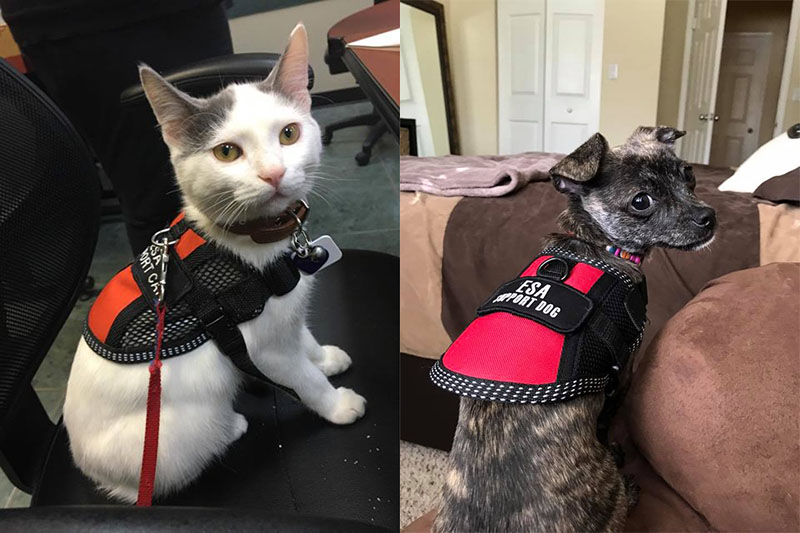
By now, most people are familiar with working animals such as therapy and service dogs. Therapy dogs go into hospitals, nursing homes, schools, and other places to help a group of people feel better emotionally. Service dogs are trained to perform tasks that assist one disabled individual. But fewer people are familiar with Emotional Support Animals.
Emotional support animals provide support and companionship to individuals who suffer from emotional and mental disabilities. Emotional support animals are guaranteed housing and flying rights by the Fair Housing Act (FHA) and Air Carrier Access Act (ACAA) without standard associated pet fees, but ESA’s do not have the same public rights as service animals. Unlike service or therapy animals, emotional support animals do not have to be dogs. ESAs can be dogs, cats, birds, reptiles, and other types of animals. Different animals can offer support to many different kinds of people. Some might prefer the benefit from the emotional support of dogs, especially since a dog needs physical activity and care. A dog might encourage an individual with depression to walk more, but some people suffer from limited mobility and might find the companionship of a cat more suitable. Birds can be very talkative and affectionate companions who form lifelong bonds with their owners. Reptiles can require meticulous and specialized care, providing a mental distraction and escape from the stress and suffering from disorders. Offering different types of animals that require a diverse range of care offers options to people with unique conditions and needs.
ESAs do not have to be trained to perform any tasks that help with disabilities, but they should have good social manners. While they are not always trained to help their owners, they do assist their owners in other ways. These animals can offer emotional support for individuals suffering from depression, anxiety, PTSD, and other emotional and psychiatric disorders. In addition to emotional support and mental health, ESAs can provide companionship to those suffering from chronic pain and limited mobility.
To obtain flying and housing rights for your emotional support animal, you need a licensed mental health professional’s letter. Many like to supplement an emotional support animal letter with an ID card and certificate for visual and easily accessible identification. Some airlines require photo identification for ESAs to fly inside the cabin of the airplane. Letters and registration ensure housing rights, flying rights, and visual identification for airlines and landlords.
If you would like to see if you qualify for an evaluation with one of our mental health clinicians, please call (985) 242-7207 or email [email protected]. Our mental health experts can do a consultation via telephone to see if you qualify for emotional support animal. If they determine that you suffer from a condition defined in DSM-V and you are approved, we can deliver your letter via email the same day. Additionally, if you would like to be registered in our database and receive a picture ID for your animal, you can register your animal as an Emotional Support Animal through our website.